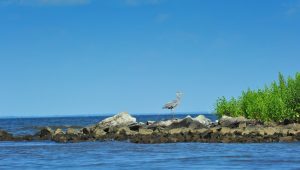
U.S. Sen. Shelley Moore Capito of West Virginia on Nov. 16 introduced the bipartisan Chesapeake Bay Farm Bill Enhancements Act of 2017 and so far, she’s the only Republican cosponsor.
The bill would increase to $300 million from $100 million a fund to support farmers who take preventative measures that stop pollutants from running off their farms and into the fragile Chesapeake Bay watershed, which exists in Capito’s home state, five other states and the District of Columbia.
“The Chesapeake Bay headwaters in West Virginia sustain important ecosystems and play a vital role in our state’s economy,” Capito said. “This bipartisan legislation will provide essential grant funding for West Virginia, which will go a long way in continuing our efforts to support the bay’s restoration and care, ensuring that it remains a vibrant natural resource for future generations.”
The bill aims to foster a healthier Chesapeake Bay through improved regional conservation efforts, including grants to farmers for practices protecting water quality.
Additionally, the bill would enhance technical assistance for conservation partners, develop multi-state watershed restoration plans, prioritize water quality, and increase funding for the Regional Conservation Partnership Program (RCPP).
The 2008 Farm Bill established the Chesapeake Bay Watershed Initiative to support agricultural producers’ efforts to minimize excess nutrients and sediments that damage the bay, according to Capito’s office. An average of approximately $50 million was invested annually in the Chesapeake Bay through the initiative.
In 2014, the RCPP was created to prioritize conservation resources previously handled by separate programs, such as the watershed initiative. But Chesapeake Bay preservation and conservation work has received significantly less funding through the RCPP, averaging roughly $13 million annually, a figure Capito and her colleagues would like to see increased.
In fact, the RCPP since 2014 has invested just more than $19 million on six West Virginia projects, which “have improved water quality and benefited the wildlife in our streams and rivers in the Eastern Panhandle,” said Capito’s West Virginia colleague Sen. Joe Manchin, a Democrat who joined her in introducing the bill.
“Overall, these investments have improved water quality in the Chesapeake Bay, without placing an unfair burden on the state,” Manchin said.
Congress currently is debating how much funding should be included in the upcoming national budget that would be targeted to a bay cleanup program across the six states in the Chesapeake Bay watershed: Maryland, Virginia, Delaware, West Virginia, Pennsylvania and New York, plus Washington, D.C.
The budget proposed by President Donald Trump would end $73 million in federal funding for the program, which has thus far supported work that is halfway completed.
Nutrient and sediment pollution from farms is by far the largest source of contamination in the Chesapeake Bay and its tributaries, the Choose Clean Water Coalition wrote in an Oct. 16 letter sent to U.S. senators urging their support of the bill.
“There are 87,000 farms in the six-state Chesapeake region. Those that are well run protect their water resources and add much to our landscape, environment and economy,” wrote the Annapolis, Maryland-based coalition. “We want to ensure that these responsible farms and farmers remain economically viable.”
Introducing the bill along with Capito were U.S. Democratic Sens. Chris Van Hollen and Ben Cardin of Maryland; Mark Warner and Tim Kaine of Virginia; Bob Casey of Pennsylvania; Tom Carper and Chris Coons of Delaware; and Kirsten Gillibrand of New York. U.S. Rep. Robert Scott (D-VA) introduced an identical bill in the House.



